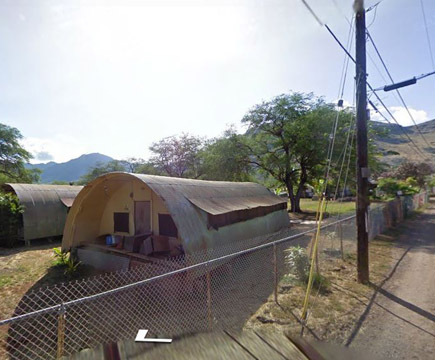The neighborhood at the back of Nanakuli valley was sketchy, although I never knew it until later. A stinky piggery led up to stacked auto wrecks across from my grandparents' WWII Quonset huts fronting the eight-acre property. I had been in them only once. The huts were rentals to people who today we might call low-income. A single floor-to-ceiling corrugated metal sheet rounded over a bare wooden floor. Tree knots like oval eyes appeared as ghosts from the plywood floor full of splinters in the windowless hut. The tin houses and the out-house in the back were the first dwellings on Great-grandma’s property long before her son-in-law Grandpa built the red house with plumbing. The rutted road to the main house was littered with cane toads flattened like pancakes. And always, a white cloud of coral dust fill blew from behind Grandpa's Datsun truck or Grannie's blue Volkswagen bug, heat rising to the wilted pomegranate tree at the driveway.
All around the property lay the remnants of failed crops; the sagging grape vine trellis, cotton that was never harvested, the earth cracked open. But the tangerines bore
|
|
|

small, sweet fruit encased in leather pouches. And always somewhere in the yard was Great-grandpa, the old man, as my grandparents called him, watering the lime tree or laua‘e ferns skirting the concrete path around the house.<next>
|